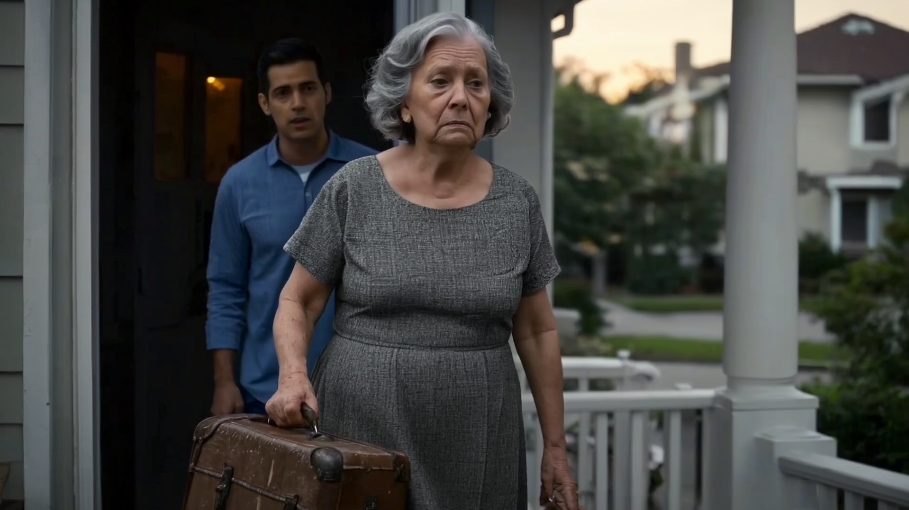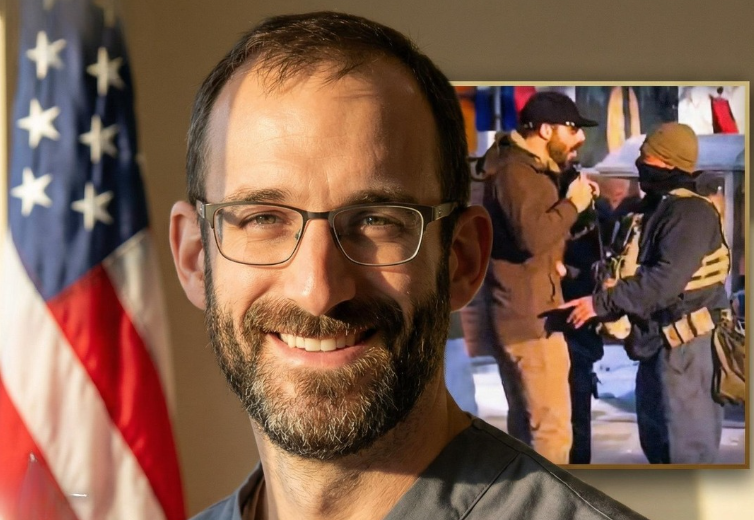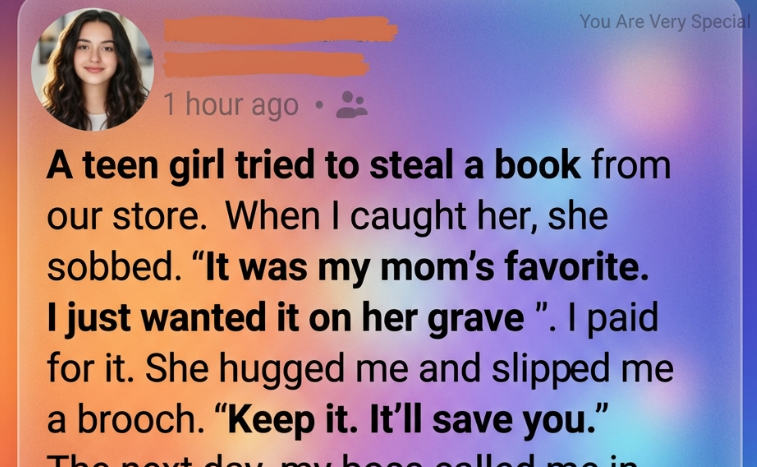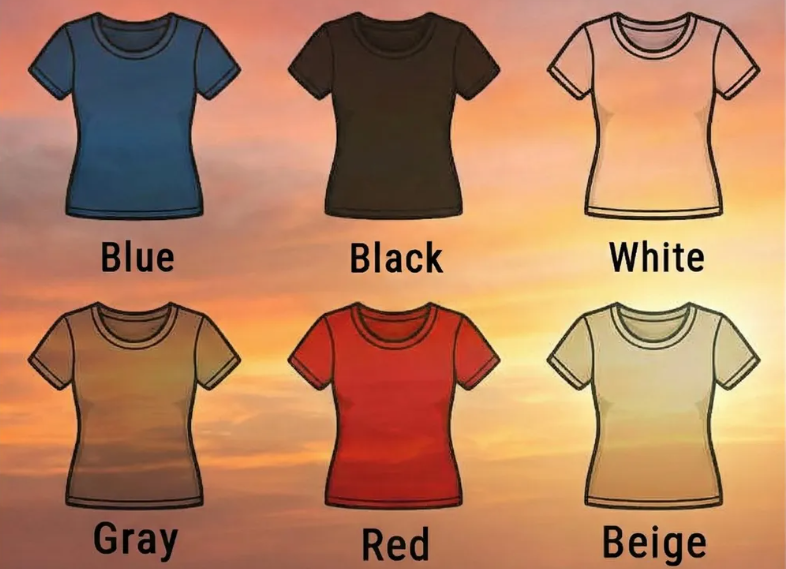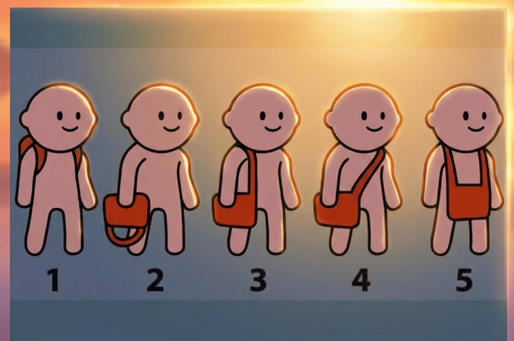Evelyn was 72 years old when her own son kicked her out of the house, and it all stemmed from her losing her job. No screaming, no tears, just the sound of a door clicking shut behind her, quiet yet final. It didn’t slam, it didn’t need to, because sometimes silence can fracture a heart more profoundly than any shout.
She stepped outside with a worn-out suitcase and a grip so tight on the handle one might think she clutched her entire life within it. Perhaps she was. Her son Jason stood in the doorway, arms crossed, avoiding her gaze.
Melissa, his wife, leaned against the frame behind him, displaying that half-smile people adopt when they’ve finally achieved their desires.
“You cannot stay here anymore, Mom,” Jason stated, his voice flat. “We have children’s expenses. We simply cannot support you both. ]
I apologize.” No one embraced her. No one inquired if she was well. She had once forgone meals to purchase Jason his very first college textbook. Now she was merely a burden, devoid of a paycheck.
And so she walked, one step at a time, dragging the suitcase that scraped the sidewalk as if whispering, You’re on your own now.
However, what Jason didn’t know, what no one knew, was that inside her worn leather purse was a debit card providing access to a hidden bank account holding $1.4 million. Evelyn did not shed a tear.
Not when she departed the porch. Not when her legs began to ache midway down Maple Street. Not even when she sat on the cold wooden bench at the bus stop three blocks from the house that once belonged to her.
She simply sat there, her back hunched, her hands clasped tightly over the handle of her purse, observing the world as it unfolded, as if it had already forgotten her.
What Jason didn’t know was that Evelyn hadn’t been dismissed from her employment; she had resigned.
Her back had become debilitating. The doctor had warned her against lifting heavy boxes, stating it could result in permanent spinal damage.
So, after years of assisting at the church thrift store, she quietly withdrew.
The pastor requested her to remain. She smiled, stating she required rest.
And she did. She needed rest from a lifetime dedicated to survival. She had raised Jason independently after his father died in a construction accident. She cleaned motel rooms, scrubbed hospital floors, and declined new shoes so he could possess textbooks.
She accomplished this with pride, with love. However, the most arduous aspect of motherhood, she now realized, was not the self-sacrifice.
It was the subsequent silence, when the very individuals to whom you had dedicated everything ceased to acknowledge your existence.
She had experienced hunger. She had experienced solitude. She had comprehended what it meant to count coins in a dimly lit kitchen and pretend the flickering light bulb was perfectly adequate.
Yet she had never experienced this. Rejection. From her own child.
Still, she harbored no animosity toward him. She could not. Instead, she reached into her purse and retrieved a folded piece of paper.
A deed, aged and yellowed, yet clearly stamped. 34 years prior, after her husband’s passing, the insurance company had provided a modest payout.
Tucked into the back of the envelope was an item everyone else overlooked.
A land deed for 40 acres in a remote corner of the state, bequeathed by an uncle they scarcely recalled.
At the time, people considered it worthless. No water. No road. No power. “Sell it for a few thousand,” they had advised.
But Evelyn did not. Each year, she managed to gather sufficient funds to pay the taxes. Even when she possessed nothing, she clung to it.
“Just in case,” she would whisper to herself. Last autumn, a man in a suit appeared at the church.
He stated he represented a development company. They were constructing a solar energy facility and required that specific parcel of land. He presented an offer. Evelyn did not hesitate.
She posed one question: “Can this transaction remain private?” Three weeks later, the sum of $1.4 million was discreetly transferred into a trust managed by a non-profit organization established in her husband’s name. To the outside world, she remained Miss Evelyn, with her practical shoes, secondhand coat, and the small apron she wore while serving coffee at Sunday brunch. Now, however, she possessed options.
That night, Evelyn did not check into a hotel. She spent the night at a women’s shelter. Not out of necessity, but from a desire to sit among individuals who would not inquire about her possessions.
People who had once felt as invisible as she now did. She shared the meager provisions in her bag.
Listened to their narratives. Laughed softly when someone offered a jest.
Held a woman’s hand when she wept about a daughter who refused to return her calls. And for the first time in an extended period, Evelyn felt acknowledged.
The next morning, she visited a dilapidated cottage on the edge of town.
It featured cracked windows, peeling paint, and untamed weeds ascending the porch railings.
She purchased it with cash. Three weeks later, operating under the name Grace Holdings LLC, the property underwent a transformation. Fresh paint, a repaired roof, solar panels, a new garden.
Yet, no one knew it belonged to her. And that was precisely her intention.
She harbored no desire for retribution. She did not wish for the neighbors to gossip. She did not want Jason or Melissa to return simply because she now possessed wealth.
What Evelyn desired was to construct something that would never cast anyone aside. And so she did.
She began volunteering at food pantries, shelters, and youth centers. Quietly inquiring about their needs.
Secretly funding necessary repairs. Donating under names no one could trace. And when the opportune moment arrived, she acquired a building. An old community hall, boarded up for years.
She christened it Evelyn’s Table. It was not extravagant, but it exuded warmth.
Genuine warmth. Hot soup. Clean cots. Soft music. A haven for those without a destination.
Individuals like herself. Individuals who had been forgotten, not for their lack of worth, but for their perceived lack of offerings.
Evelyn offered regardless. Because she remembered. And because, deep down, she still harbored a faint hope that her son would remember as well.
Two years passed. The seasons quietly transitioned. The world continued its course.
And Evelyn, well, she blossomed in silence. Evelyn’s Table had transcended being merely a building.
It became a rhythm. A heartbeat. Soup simmered on the stove each morning.
Children played in the back garden, amidst sunflowers taller than their heads. And each Friday night, lights emanated from the windows as people gathered for community dinners. No questions asked. No paperwork required.
However, elsewhere, life had not been as benevolent. Jason lost the house. Initially, it involved minor issues—missed payments, escalating bills.
Then came the eviction notice. Then the locks were changed. Melissa departed, taking the children. She stated she required stability.
Jason attempted various part-time jobs, warehouse shifts, even sold his old guitar.
Yet, nothing endured. Eventually, he found himself sleeping on a friend’s basement cot, sharing ramen with cockroaches, pondering the origin of his misfortune.
One rainy afternoon, he sought refuge in the public library to escape the dampness.
Near the front desk, he noticed a flyer. Cream-colored paper. Elegant script. A small wooden logo that seemed oddly familiar.
Evelyn’s Table. Meals. Shelter. Support. No one left behind. He froze. His fingers trembled as he re-read the name.
Evelyn. It couldn’t be. Yet the ache in his chest suggested otherwise.
He fixated on the address. He recognized the street. He had driven past it countless times. He had never paid attention.
The next morning, an inexplicable compulsion drew him there. Call it guilt. Call it hope. Call it the final thread of connection he possessed. He walked across town in worn shoes and discovered it – a small building, freshly painted, framed by wildflowers.
Children’s laughter emanated from within. Steam curled from a kitchen vent. Above the front door, carved into wood, were the words: Evelyn’s Table.
Everyone has a place. He stepped inside. Warmth immediately embraced him, not merely heat, but a palpable sense of presence. The aroma of fresh bread. The gentle clatter of dishes. Volunteers moving with a quiet grace, as if they belonged.
Then, behind the reception desk, clad in a beige cardigan, her silver hair neatly tucked behind her ears, sat a woman he had not truly observed in years. His mother. She looked up. Her eyes widened, but she did not flinch. Jason froze. His throat burned.
Words caught like gravel in his mouth. “I… I didn’t know where else to go,” he whispered.
Evelyn slowly rose. Walked around the desk. Stopped directly in front of him. Jason could not meet her gaze. He was trembling.
“I lost the house. Melissa’s gone. I… I have nothing.” Silence. Then Evelyn spoke softly and steadily.
“Come inside. You appear cold.” She guided him to a small table, placing a mug of warm tea before him.
He looked around, still dazed. “This place, it’s yours?” he asked. She nodded.
“I believed you possessed nothing,” he stated. “I had peace,” she replied. “And enough.” His voice cracked.
“Why did you not inform me of your financial well-being? That you were alright?” She looked at him gently. “Would it have altered anything?” He offered no response.
“I needed to understand,” she continued, “who would stand by me when I had nothing to offer.
That is how I determined for whom to build this.” “I was dreadful to you,” he confessed.
“You trusted me. I cast you out.” Evelyn reached across the table and took his hand.
“You lost your way,” she stated. “That does not preclude finding it again.” In that moment, Jason wept. Not loudly. Not melodramatically.
A quiet, steady flow that spoke of shame, gratitude, and a forgiveness akin to rebirth.
Spring arrived slowly that year. Gentle rain. New leaves. And a subtle, quiet blossoming of healing. Jason began volunteering at Evelyn’s Table.
He mended broken chairs. Organized canned goods. Assisted in patching roof leaks. He did not request compensation. He simply appeared. Daily. As if compensating for every day he had missed.
Evelyn rarely spoke. She had no need to. Each Friday evening, they sat together on the porch, observing the children at play in the garden.
No guilt. No retribution. Only presence. And peace. One such evening, Evelyn presented him with a sealed envelope. Jason looked at her, puzzled. He opened it.
Inside was the original deed to the house, the one she had once given him.
And the voided check from the land she had sold, framed together.
He looked up, speechless. “You owe me nothing,” Evelyn stated. “However, now you comprehend the consequence when affection precedes arrogance.”
Jason could not reply. He had no need to. He finally perceived her not merely as his mother. Not as the one who stayed awake when he was ill.
But as a complete individual. Someone who had been broken and yet chose kindness.
Evelyn passed peacefully in her sleep that autumn. No headlines. No lengthy eulogies.
Only a modest service attended by over a hundred individuals.
People from shelters. Schools. Churches. Individuals who fully comprehended who she was. Jason stood at the front, holding her cherished apron. He took a breath and stated softly, “My mother once departed a house with nothing but a suitcase and a tranquil spirit. Yet in that silence, she constructed something grander than any of us ever knew.”
He turned toward the doorway. Above it, carved into the wooden arch, were the words Evelyn herself had inscribed the day the shelter opened: The doors that close behind you can never match the ones you open for others. And Jason, once consumed by anger, once adrift, had transformed into the man his mother had always believed he could become. Not because she possessed wealth, but because she chose love over vengeance and forgiveness over pride.
